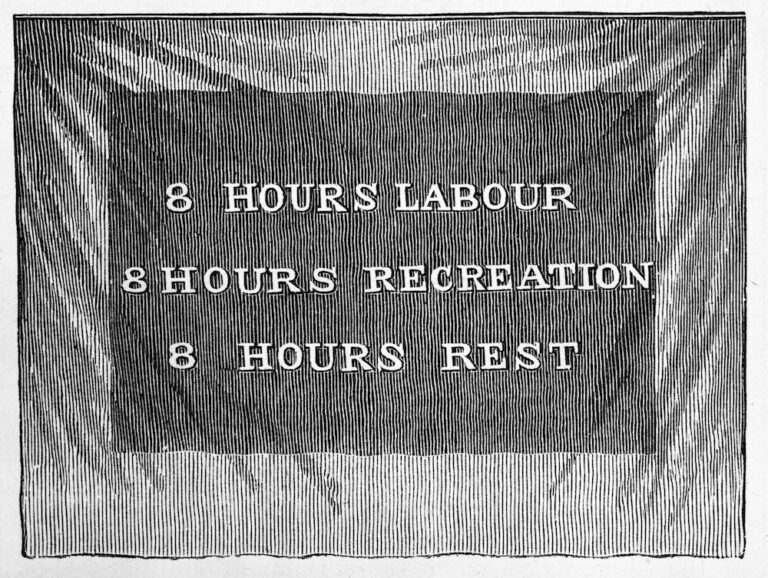In her second book, Why We Can’t Have Nice Things: Social Media’s Influence on Fashion, Ethics, and Property, Minh-ha T. Pham continues her examination of fashion’s digital labors, by analyzing what she terms crowdsourced intellectual property (IP) regulation. Pham argues that crowdsourced IP regulation follows a script that reaffirms the racial and class hierarchies that govern global fashion. A process that occurs across social media platforms, crowdsourced IP regulation does not actually adjudicate theft or ownership, but instead marks a site of struggle wherein the right to copy is publicly forged via commonsense, racialized ideas about who or what a “copycat” looks like. Pham explores this process through several case studies, as well as through the history of intellectual property within the fashion industry in the United States. Pham concludes her book with some reflections regarding the possibility of ethical fashion amidst a deeply unethical industry.
Keyword: labor
Making Live through the Gig: The Case of Comfort Taxis in Singapore
Against the scholarly emphasis on precariousness, this article focuses on how gig work in 1970s Singapore was developed with the specific vision of enabling life for the working-class Singaporean family-man. From 1970 to 1993, the taxi company Comfort invested its operations with a powerful vision of the transformative potentials of taxi-driving labor. The gig work of taxis was made to change the work ethic of men, creating workers and fathers who could advance class mobility, nation-building, and the family, raising children who would become ideal workers of the future. Such hopes, however, still relied upon the insecurity of the gig to force the men into adherence. Entangled with patriarchy, nationalism, and familialism, this article examines the compromises exacted through the gig’s capacity to make live, and analyses how Comfort’s experiment has left a legacy in the ways that platformed gig work is governed today, which needs engagement and revision.
Review of Fates of the Performative: From the Linguistic Turn to the New Materialism by Jeffrey T. Nealon (University of Minnesota Press)
Jeffrey T. Nealon’s Fates of the Performative: From the Linguistic Turn to the New Materialism crafts a history of performativity within contemporary theoretical thought. Through the structure of a genealogy, Nealon examines the nascence of performativity and its intersection with biopolitics and neoliberalism to predict not only the future of the performative, but also to imagine new avenues of criticism within the humanities.
Back to Basics with Labor-Power: The Problem of Culture and Social Reproduction Theory
Ted Striphas recently called for a return to the “problem of culture” within cultural studies. This is a political as much as a methodological provocation: “culture” became an object of analysis among mid-twentieth century scholars in dialogue with Marxist accounts of ongoing political crises. Taking a cue from this past, this essay rethinks culture in relation to the ongoing crisis in social reproduction via Social Reproduction Theory (SRT). Within some Marxist feminist currents, “social reproduction” refers to the reproduction of labor-power, Marx’s term for the capacity to work sold on the market in exchange for wages. Marxist feminists have theorized such matters at length via their analyses of the practices undergirding the reproduction of labor-power. SRT is not unfamiliar to cultural studies scholars, but those engaged with it tend to explore the representation of socially reproductive practices within culture rather than the ways culture itself contributes to labor-power’s reproduction. This is unsurprising. Historically, the field has discussed labor-power in terms of its circulation rather than its reproduction, detailing culture’s role in reproducing social systems. Drawing upon Michael Denning’s “labor theory of culture,” recent work in SRT, and Marx, I argue that culture functions in a socially reproductive capacity within the logic of capitalism. In doing so, it casts cultural struggle as a form of social reproduction struggle at the intersection of labor-power’s reproduction and that of the society that requires it. This essay constructs a systematic account of culture’s socially reproductive function before using it to consider its historical expression in the current moment.
Review of Empire’s Tracks: Indigenous Nations, Chinese Workers, and the Transcontinental Railroad by Manu Karuka (University of California Press)
Empire’s Tracks: Indigenous Nations, Chinese Workers, and the Transcontinental Railroad by Manu Karuka suggests that the Transcontinental Railroad is a useful lens through which to view issues relating continental imperialism, countersovereignty, and capitalist modes of production.
UBI as a Tool for Solidarity: A Response to Richard Todd Stafford
I am examining UBI in order to imagine a more egalitarian democracy under capitalism through the redistribution of national wealth that all labor, paid and unpaid, create. I maintain that the redistribution of capital through a UBI cannot be completely dismissed; however, the key would be to remain dedicated to emboldening individual economic agency through bottom-up initiatives while battling for infrastructural changes in a governmental, top-down fashion.
Review of The Composition of Movements to Come: Aesthetics and Cultural Labor After the Avant-Garde by Stevphen Shukaitis (Rowman & Littlefield International)
Stevphen Shukaitis has produced an interesting text by situating a strategic conversation between artistic avant-gardes and autonomist political movements. He begins with a plea for rethinking strategy, and not just questions of tactics, in seeking radical aesthetic and socio-political change.
Review of Farm Worker Futurism: Speculative Technologies of Resistance by Curtis Marez (University of Minnesota Press)
In this focused visual-cultural history of farm work in California over the course of the twentieth century, Curtis Marez draws on a materialist and critical approach to understand the representations, in various media and formats, of farm workers, and of the activist movements that they have championed. Marez frames analyses of cultural artifacts, including speculative and science-fiction books and films, documentaries, propaganda, and studio artworks, in the historical and material conditions of those farm workers’ movements. Throughout, he foregrounds the people who shaped modern labor movements, from the vineyards of the San Fernando and San Joaquin Valleys and beyond. Marez argues that competing material interests, socio-technical mediations, and historical conditions—the animating conflicts of this account, between agribusiness and farm laborers—have shaped broader expressions of “americanism”, imagined futures, and visual cultures across North American societies, through the very contradictions that animate and constitute them.
Species-Beings in Crisis: UBI and the Nature of Work
Marx famously argued that labor, under capitalism, alienates humans from not only the products of their labor, but from their very nature. Further, capitalist labor presents a “double freedom” for the worker that is, of course, anything but free: the freedom to either work for an exploitive boss, or to refuse, and starve. UBI would seemingly allow for way out of such a conundrum, but would it also open the door to allow humanity to regain their status as “species-beings”? I explore the idea of UBI as presenting an opportunity for meaningful work and a subversion of the logic of capital. Does UBI indeed grant workers more freedom, or does it merely contribute to the continued denigration of social relations under capital?
Decommodified Labor: Conceptualizing Work After the Wage
A way to think labor after finanancialization, decommodifed labor refers to an emptying out of the same wage relation that nonetheless continues to structure our lives. “Working hard or hardly working” needs a new conjunction: in an age of decommodifed labor, one finds oneself working hard and hardly working. I suggest that decommodified labor offers cultural critics a form for isolating labor today that takes account of its relation to the wage, that may assist in periodizing the capital-labor relation, and that also highlights financial change alongside labor’s durational necessity under capitalism.
Doing What You Love in the Age of Mass Debt
This paper examines the relationship between student debt and the changing terrain of work in U.S. culture, while attending to how these shifts mark a specifically gendered, racialized phenomenon. Drawing on the AAUW’s 2017 report on student debt, this paper examines the figure of the fashion intern in order to think about how the gender and racial inequities in student debt collude with what Angela McRobbie terms ‘the feminization of work’ to effect a gendered, racialized form of indebtedness. I assert that the ‘do what you love’ ethos described by Miya Tokumitsu contributes to the proliferation of feminized work in the culture industries, such as fashion, and the perpetuation of racial exclusivity within the industry.
Review of Media and Culture in the US Jewish Labor Movement: Sweating for Democracy in the Interwar Era by Brian Dolber (Palgrave Macmillan)
Brian Dolber comprehensively explores the cultural and media-related developments of an important American social movement during its most transformative time: the varying business enterprises, community associations, party structures, and social institutions that collectively constituted ‘US Jewish labor’ in the decades between WWI and II. Dolber infuses his historical analysis with a nuance and urgency that ensures his readers will neither complacently shrug off the interwar era as limited in its relevance to our contemporary conjuncture nor nostalgically long for a supposedly romantic period of leftist political organizing in the US Indeed, a tacit takeaway drawn from Dolber’s book is that activists today (especially those experimenting with alternative media and cultural formations) can benefit greatly from both the inspiring examples of past precedence and a sober acceptance of the potential pitfalls that can threaten their efforts.
Review of The Cultural Politics of U.S. Immigration: Gender, Race and Media by Leah Perry (NYU Press)
Leah Perry’s The Cultural Politics of U.S. Immigration: Gender, Race, and Media is a timely exposition of how our racialized and gendered immigration paradigms came about as well as what makes them uniquely neoliberal. Perry offers a meticulous account of immigration reform in the 1980s and 90s—including how it negotiated, accommodated and ultimately co-opted the gains of feminism and multiculturalism—while also showing how its discourses were refracted in popular culture and thus within the lived experience of a hegemonic neoliberalism. Perry’s analysis that will interest scholars of media, popular culture, and immigration policy alike, and that, in the true spirit of humanistic inquiry, reveals the work of culture in the circuitry of power.
Review of Necroculture by Charles Thorpe (Palgrave Macmillan)
Charles Thorpe’s Necroculture attempts to demonstrate that the variegated experiences of alienation under the technocratic culture of neoliberal capital are experiences tantamount to a culture of death. Thorpe suggests that the root of the necrophilia that defines contemporary capitalist culture is in the valuing of non-living objects over living human beings. In the alienation and replacement of imperfect human labor with automated dead labor and in a highly atomized consumer culture where social participation is mediated by commodity fetishism, the non-living are given priority over the living.
Review of Alien Capital: Asian Racialization and the Logic of Settler Colonial Capitalism by Iyko Day (Duke University Press)
Iyko Day makes a compelling intervention in discussions of race, capital, and settler colonialism. Her book presents a theorization of the abstract economism of Asian racialization by examining how social differentiation functions as a destructive form of abstraction anchored by settler colonial ideologies of romantic anticapitalism. By engaging with capitalism’s abstraction of differentiated gendered and racialized labor in order to create value, Day’s project diverges from scholarship arguing that capitalism profits from labor via the production, rather than the abstraction, of racialized difference (Lowe 1996; Roediger 2008). Her book engages a rich multimedia archive and uses principal historical instances of Asian North American cultural production as theoretical texts to examine key racial policies since the 19th century: Chinese railroad labor in the 1880s, anti-Asian immigration restrictions; internment of Japanese civilians during World War II, and the neoliberalization of immigration policy in the late 1960s.











